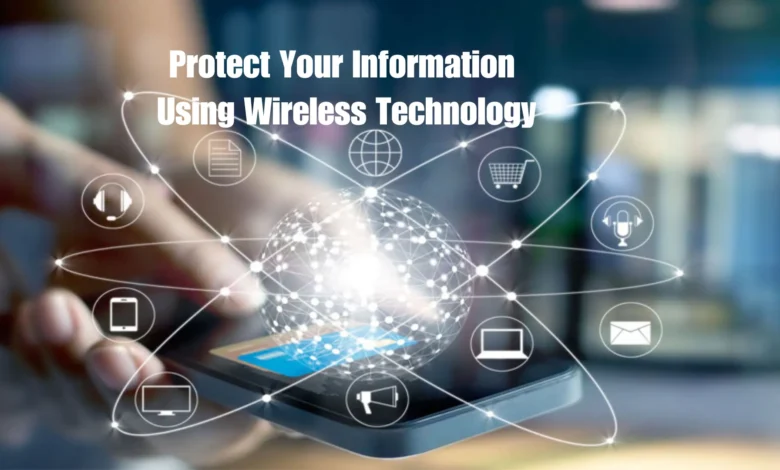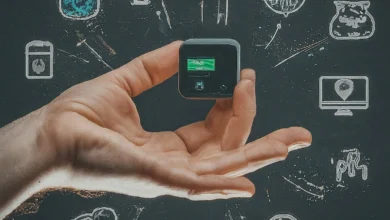How Can You Protect Your Information When Using Wireless Technology?

Wireless technology has become a crucial aspect of our everyday lives in today’s linked society. We depend on wireless connections for ease and accessibility across a variety of devices, including smartphones, computers, smart home gadgets, and open Wi-Fi networks.
Wireless technology’s comfort, but, also raises the possibility of data breaches and privacy issues. Using wireless technology responsibly is essential to preserving your sensitive and private information. In this blog article, we will explore how can you protect your information when using wireless technology? And how to improve wireless technology security and privacy.
What Even Is Wireless Technology?
If radio frequency (RF) connections are utilized to connect network nodes, a computer network is referred to as a wireless network. Wireless networking is a popular choice for homes, businesses, and telecommunications networks. But in this modern age, it’s imperative to know how to protect your online identity.
Despite the fact that wireless networks are present almost wherever people live and work, many people are unsure of how they operate, therefore it’s usual for people to question what is a wireless network? Similar to how people frequently believe that Wi-Fi is all wireless, many people would be shocked to learn that the two terms are not similar.
Both utilize RF, however although Wi-Fi is exclusive to the wireless protocol established by the Institute of Electrical and Electronic Engineers (IEEE) in the specification and its modifications, there are many alternative types of wireless networks comprising a variety of technologies (Bluetooth, ZigBee, LTE, and 5G).
Types Of Wireless Network
Local Area Network(LAN)
A local-area network is a type of computer network that only operates at one location, such an office complex. It may be used to link together many different parts, including computers, printers, and data storage units. Switches, access points, routers, firewalls, and Ethernet cables are used to connect the various parts of a LAN. The most well-known wireless LAN is Wi-Fi.
Personal Area Network(PAN)
A personal area network is made up of a network centered on the gadgets of one individual in one place. Computers, mobile phones, video gaming consoles, and other associated devices might all be found in a PAN. They are typical in residences and modest office complexes. The most well-known wireless PAN is Bluetooth.
Metropolitan Area Network
A metropolitan-area network is a computer network that spans across a city, small geographical area, or business or college campus. The size is one characteristic that sets a MAN apart from a LAN. A LAN typically consists of a single structure or location. Depending on the requirements of the company, a MAN may cover a large area.
If a large company has a large campus and has to handle essential elements like the HVAC and electrical systems, they could utilize a MAN.
Wide Area Network
A city, state, or even a whole nation can be covered by a wide-area network. Actually, a WAN is the internet. A WAN, like the internet, may include smaller networks like LANs or MANs. The most well-known wireless WANs are cellular services. Also read our guide on different ways to boost internet speed.
Steps for Understanding How to Use Wireless Technology to Protect Your Information
Following are steps that may be taken to safeguard personal information while using wireless technology:
Keep Passwords Private
Using secure passwords for your bank, credit, and other accounts as well as your laptop. Use distinct characters in the password arrangement. You may write “I caught two Birds from the tree” as 1C2Bt. Now many apps use two factor authentication which helps to protect the password.
Securing Your Social Security Number
For privacy reasons, social security numbers must be provided. If someone asks you for our SSN, you should change some connected queries to the topic. A strong password and number should be used with the social security number system.
Safely Dispose Of Personal Information
When disposing of a computer, remove all the personal data it contains. Use a wipe utility application to erase the whole hard disk. Before you discard a mobile phone device, check the owner’s handbook and the website of the service provider. Keep a mobile device’s memory and subscriber identification module (SIM) card hidden. Eliminate the whole call history list.
Be Wise About WIFI
Keep your private information private before joining the Wi-Fi network. Understanding the Wi-Fi connection Check to verify if your information will be safeguarded before transmitting it if you are using a laptop or smartphone on a public wifi network in a coffee shop, library, airport, hotel, or other public location. When we use an encrypted website, just the data we transfer to and from that site is protected.
Unauthorized Computer Access
Your information might be hacked due to a wireless network and an unprotected file. Computer software that poses a security risk to personal data. It needs to be taken out of the computer system. Prevent unwanted computer access to the network.
Use File Sharing With Caution
It is risky for personal information to share files in an unknown location. Before sharing any files on those sites, make sure these sites are trustworthy. The first need for sharing your information is that the website be well-known and the social network be secure.
Use Security Software
Install firewall, anti-virus, and anti-spyware software before utilizing a wireless network. Set all relevant data to often update these defenses. Utilize the security software that has been installed to safeguard your data.
Save Email from Publication
Do not open files, click links, or download applications from spam emails. If you open an unexpected file from someone you don’t know, it’s possible for spyware or computer viruses to infect your machine and steal your passwords or other sensitive data.
Conclusion
Our communication system is now incredibly simple and modern due to wireless technology. The key to knowing the answer so that you can take a stance and maybe the best action to safeguard the information on wireless technology is to ask yourself, How Can you protect your information when using wireless technology? Additionally, the security of our personal data is threatened by wireless technologies. Users of this technology should be aware of the potential risks associated with private internet networks.
Read More: The Evolution of Cybersecurity and how to Protect yourself in the Digital Age





